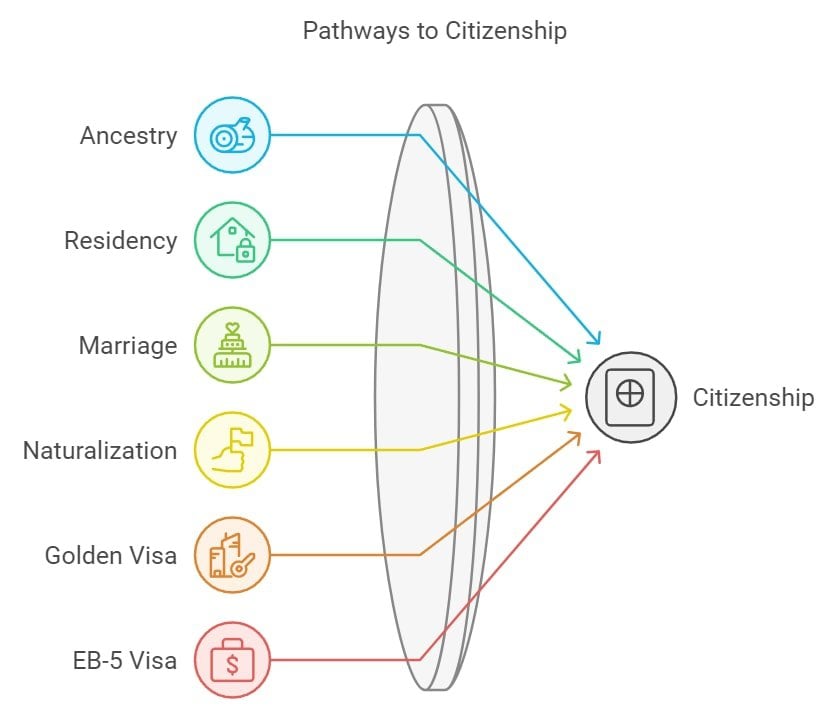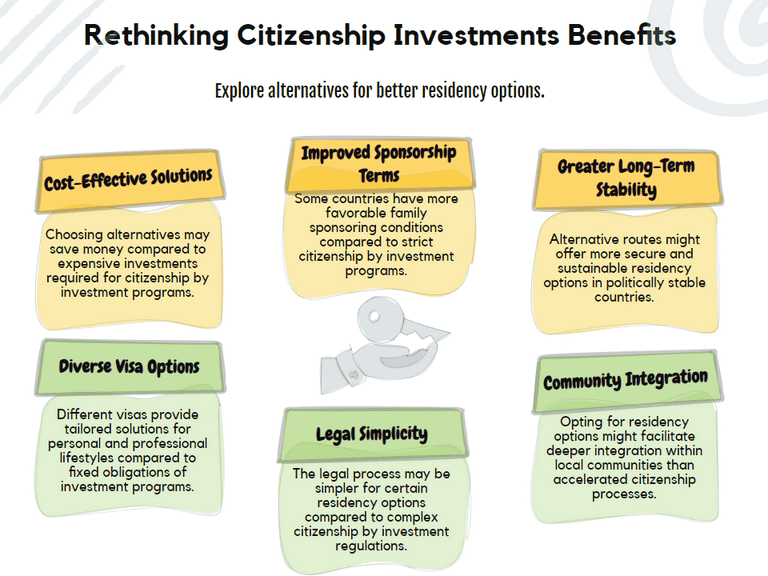Citizenship By Investment Alternatives
Boost Your Freedom Without Compromise.
- Who offers the CHEAPEST program available.
- Who offers the BEST program available.
- What you need to qualify?

- Alternatives to gaining citizenship apart from investment programs include citizenship by descent, naturalization through prolonged residency, marriage to a citizen, and special contribution recognitions.
- Citizenship by descent and marriage usually involves less financial cost but requires proving familial ties or legal marital status to a citizen of the target country.
- Naturalization processes typically demand several years of continuous residency, language proficiency, and integration into the society, often without substantial financial investment.
- Financial considerations vary widely, with some requiring minimal fees for processing and legal documentation, unlike the significant investments needed for citizenship by investment programs.
- The timeline can be longer than direct investment routes, with naturalization and marriage-based applications taking years to process, but they offer pathways to citizenship without the need for a large financial outlay.
Citizenship by investment programs have become increasingly popular over the last few years as individuals seek alternative ways to obtain residency or citizenship in another country.
Although these can offer substantial benefits, alternatives to citizenship by investment exist for those who aren’t able to participate in citizenship by investment programs.
In This Article, You Will Discover:
For your convenience, we at WorldPassports have compiled the ultimate guide on alternatives to citizenship by investment, so you have all the information you need to consider when seeking out residency or citizenship abroad.
- Who offers the CHEAPEST program available.
- Who offers the BEST program available.
- What you need to qualify?
 Free Consultation
Free Consultation Easy to Use
Easy to Use 100% Safe & Secure
100% Safe & Secure
Top 11 Alternatives to Citizenship by Investment
The alternatives to investment for citizenship typically involve longer residency requirements, such as applying for permanent residency or naturalization.
These may involve meeting certain criteria, such as a minimum length of time spent in the country, fluency in the local language, passing a citizenship test, or having close family ties to citizens of the country.

So, let’s take a closer look at the top 11 different routes to citizenship:
Citizenship by Ancestry
A possible option is applying for dual citizenship through family ancestry.
Citizenship through ancestry allows people with established ancestral links to a nation to claim dual nationality without long-term residence requirements.1
However…
Applicants typically must still meet certain criteria (including genetic testing and family history research) before they can apply successfully.
Citizenship by Residency
Citizenship by residency involves obtaining a second citizenship via residence in the new country.
This typically means living in the country for a stipulated minimum period of time before applying for citizenship.2
It’s worth noting…
Some countries may require applicants to pass certain eligibility tests, such as language exams, depending on local laws.
Citizenship by Marriage
Citizenship by marriage is an alternative - and often quicker - pathway to obtaining a new citizenship.
It involves marrying a citizen of the country you wish to gain citizenship in and meeting all of the necessary residence requirements.
Depending on the nation, couples may need to complete an assisted program to obtain official citizenship status.
Generally, spouses will need to go through a naturalization process before they can gain full citizenship rights.
Citizenship by Naturalization
Citizenship by naturalization is a legal process that involves changing your nationality and becoming a citizen of a new country.3
An individual is generally granted full citizenship rights after living in the country for a certain period of time.
But, take note:
Each country may have specific criteria for granting citizenship by naturalization.
Depending on the nation, the application process can take several months or even years to complete.
In addition, some countries may impose additional restrictions, such as language tests and financial investments, to qualify for this type of citizenship.
Golden Visa
A golden visa involves residency by investment.
Residency by investment confers legal residence or temporary residency in a foreign country in exchange for a substantial financial investment.
Depending on the country, this can include investing in government bonds, real estate, funds, or other approved investments.
Requirements and fees associated with residency by investment may vary from country to country.
But, will it result in citizenship?
It’s important to note that residency by investment doesn’t automatically result in citizenship.
Individuals seeking residency by investment usually need to demonstrate their financial stability and commitment to integrating into the host country's culture.
Read On: What is a Golden Visa?
EB-5 Visa
EB-5 visas are special visas issued by the United States Citizenship and Immigration Services (USCIS) to foreign investors seeking permanent residence in the United States.4
The EB-5 visa requires investors to make a large monetary investment, and grants permanent residency to successful applicants.
EB-5 investors must contribute a minimum of US$1,050,000 towards a US enterprise that creates at least 10 jobs for American workers.
E-2 Visa
E-2 visas are special visas available to non-US citizens from treaty countries who wish to enter the United States for purposes of investing in business operations.5
The investor is required to make a significant capital investment in a US business, but there isn’t an official minimum investment stipulated.
While this visa is active, holders may work in the USA while only paying taxes on income derived from local sources.
The E-2 visa can be renewed continuously as long as requirements set by the USCIS are met, but it doesn’t confer permanent residency status.
F4 Visa
F4 visas are issued to those with qualifying relationships with American citizens or permanent residents.6
Qualifying relationships can include siblings, children, and married adults over 21 years old.
This visa permits individuals from other countries to join family members in the United States.
However…
Applicants must meet strict filing requirements to be approved for this visa, including providing proof of relationship and financial stability.
Visa for Family Reunification
A family reunification visa is a type of visa that allows individuals to join their family members who are already lawfully present.7
Eligibility for this visa depends on the relationship between the applicant and a family member living in the country.
The visa holder must be sponsored by a qualifying immediate family member, such as a spouse, parent, sibling, or child over 21 years old.
Refugee/Asylum Seeker Visa
A refugee/asylum seeker visa is a type of humanitarian visa that allows individuals to enter a country due to persecution or fear of persecution in their home country.8
Individuals must generally prove that they have a “well-founded fear” of persecution to be deemed eligible for this type of visa.
Once granted, the visa associated with refugee or asylum status can generally be renewed or extended as required.
Retirement Visa
A retirement visa is a type of visa that allows individuals to stay in a country for extended periods.9
Individuals must prove they have sufficient funds to support themselves while living in the country without relying on public funds or employment.
Why Should You Consider Alternatives to Citizenship by Investment?
You should consider alternatives to citizenship by investment because of reasons such as cost and application time, as well as country-specific regulations.

Take a look at the details below:
Cost of Investment
Citizenship by investment can be an expensive route, as the costs and fees associated with it are often higher than those of other options.
On top of the initial investment, there may be additional costs such as taxes, legal fees, and due diligence that aren’t initially included in the lump sum fee.
Application Time & Process
It’s also important to consider the timeframes associated with citizenship by investment applications.
This route to citizenship often involves long processing times and numerous applications before citizenship can be obtained.
Country-Specific Regulations
It’s worth noting the country-specific differences in citizenship by investment programs.
Some countries may require applicants to demonstrate considerable wealth or business investments, while others may not stipulate any financial requirements.
Additionally, certain countries have restrictions on dual citizenship, while other countries may also have varying tax regulations associated with becoming a citizen through investment.
Common Questions
What’s the Cheapest Citizenship by Investment?
Which Is the Best Citizenship by Investment Program?
Can My Citizenship by Investment Application Be Denied?
What Other Avenues Are Available if My Citizenship by Investment Application Is Denied?
In Conclusion
Citizenship by investment isn’t the only route to citizenship in a new country, although it can be the quickest.
Alternative routes to citizenship include citizenship through residency, ancestry, marriage, or naturalization.
Golden visas can also be an attractive route to eventual citizenship in a country.
At WorldPassports, we understand that researching and applying for alternative options to citizenship by investment can be a confusing and overwhelming process.
Owing to the cost and processing considerations involved in applying for citizenship through investment, familiarity with the alternative routes to citizenship can be useful.
- Who offers the CHEAPEST program available.
- Who offers the BEST program available.
- What you need to qualify?
 Free Consultation
Free Consultation Easy to Use
Easy to Use 100% Safe & Secure
100% Safe & Secure





